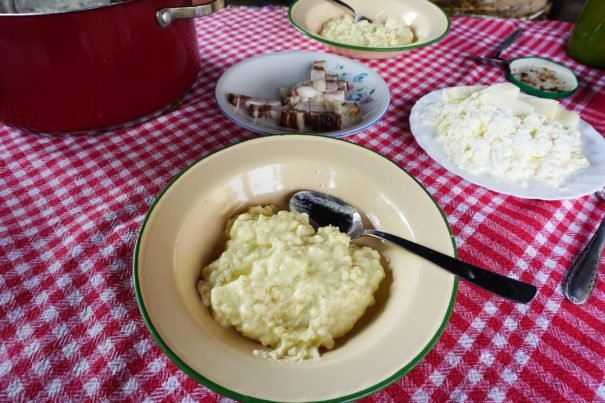
Pork Lardons in Breakfast Porridge is a Classy Move

Pork Lardons in Breakfast Porridge is a Classy Move
Cicvara in Bosnia-Herzegovina
“A wife who makes good coffee…” Mira begins. She trails off, concentrating on podding beans between sips of hot, muddy coffee. Bittersweet grit coats the bottom of the now empty džezva; the ubiquitous long-necked copper pot that makes our morning ritual complete. Mira goes back to the kitchen for a fresh batch, stopping to rinse and refill the pot with water and putting it on the heat to boil.
It’s late summer and beans are ripening on their tendrils, clinging to shears of white corn in Mira’s garden allotment. Large bedsheets speckled with beans are already drying in the sun, and there’s more to come. But today, Mira throws a good handful in a bowl and stops.
She turns back to the kitchen and begins to scoop home-ground cornmeal into a pan of warming milk. Mira is one of just a few still grinding her own corn, turning her nose up at the fields of maize that border her land, and opting instead for her own white variety, home-grown by only a handful of neighbors. Cornmeal has threaded itself through Bosnian cooking for centuries and in the time I spend with Mira, we share many of her childhood favorites; ljevača; a rich, cheesy cornbread dipped into bean soup, polenta-like pura, and hard, round discs of day-old unleavened cornbread. Today she’s making cicvara, a calorie-fueled, cornmeal porridge (of sorts), now more typically suited to Orthodox Christmas mornings than the belly-filling needs of former shepherds.
Stirring the hot milk to stop it curdling, Mira reminisces about a childhood spent raising crops and keeping livestock in order to survive. It was here, on this very land in northernmost Bosnia, that Mira was born and raised in 1960s Yugoslavia.
As she talks, she eyes her son, Nikola, attentively. He’s come on a rare visit from Zagreb, Croatia’s capital, just a two-hour drive over the border, and where she moved to train as a nurse and raise a family in her 20s. It was there that they remained during the Yugoslav wars, while violence tore apart the communities in which she grew up, and divisive borders were erected as Yugoslavia fell apart.
“I moved back to what became Bosnia-Herzegovina to stop myself from forgetting,” she tells me, clearly concerned with the growing disparity between her own modest upbringing and her children’s staunchly metropolitan outlook.
She dollops in thick creamy kaymak, a cheesy-tasting clotted cream which Mira makes regularly, skimming the cream from the surface of lightly salted scalded cow’s milk. She stirs in a tub of the stuff, fresh and mild in comparison to its more mature cousins in the fridge, leaving the pot to bubble slowly until thick and creamy. With care, she ladles the oozy cicvara into bowls, handing them out with platefuls of pork lardons, extra kaymak and fresh cheese to bring to the table. Coffee is poured. Breakfast is ready.